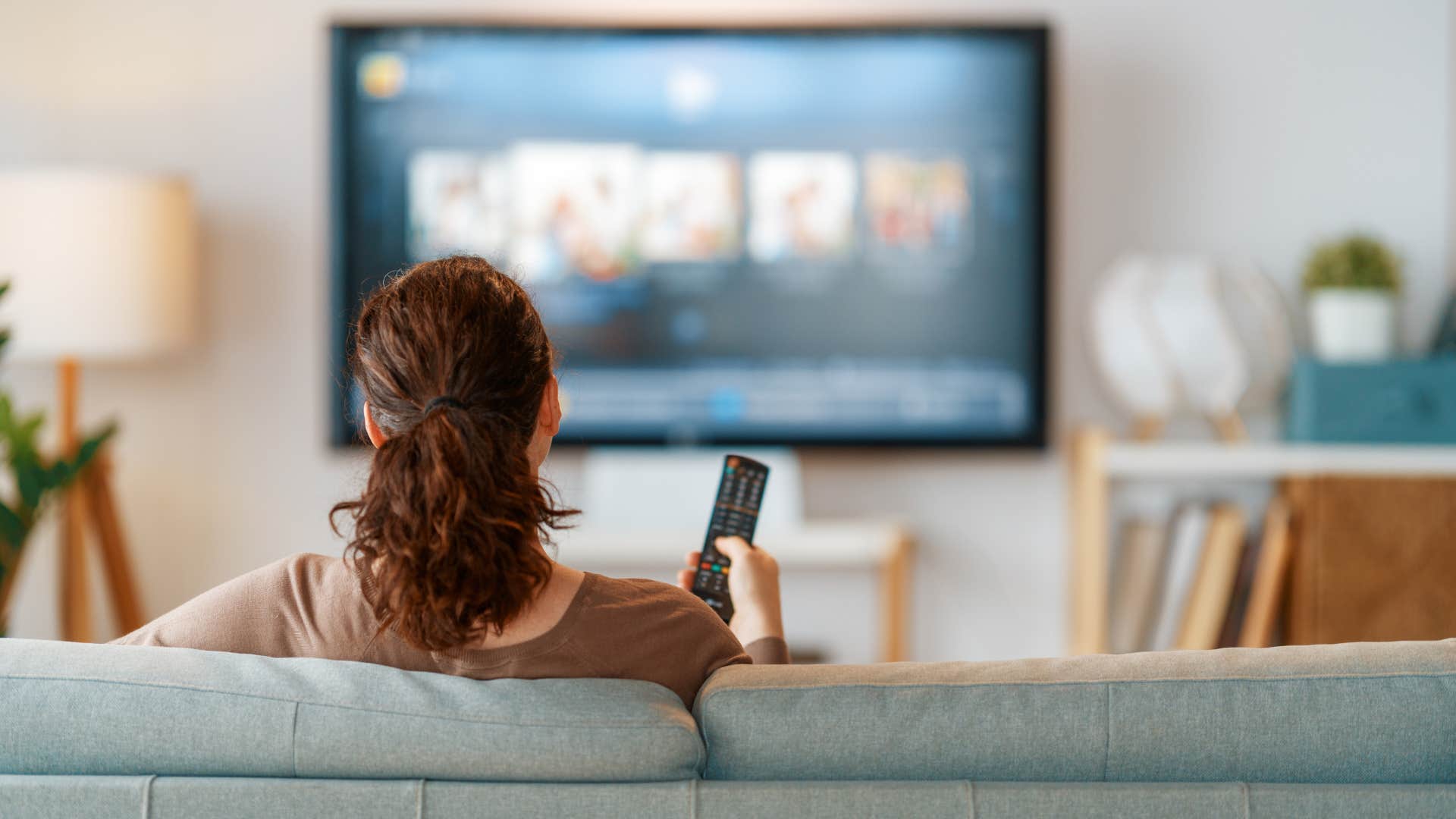People Who Always Need To Have The TV On At Home Usually Have These 11 Reasons
Sometimes the easiest way to drown out our thoughts is a good TV show we've seen hundreds of times.
 MAYA LAB / Shutterstock
MAYA LAB / Shutterstock I am guilty of always needing the TV on while I’m home. This is especially true if I am home alone. There is a comfort to having a show you’ve seen hundreds of times playing as you tackle chores or cook dinner. TV show characters can become almost like friends. You feel a sense of company when they’re talking through your speakers. At least, that’s how it is for me.
People who always need to have the TV on at home have many reasons why. Some would rather listen to music or an audiobook, but for those who appreciate a good TV show, having a show on in the background is helpful. However, psychologists warn that relying too much on background noise for a distraction can be a problem. “Playing background noise — whether it’s a song, podcast, quiet jazz, a TV show, whatever — is tempting, for sure. And don’t get us wrong: It can be helpful sometimes,” says Ashley Broadwater. “But if you notice the urge comes from wanting to run from your emotions and thoughts, it may be time to introduce other coping skills, too.” There are healthy ways to hide behind the noise of the TV, and for those who do so, they usually have their own reasons.
People who always need to have the TV on at home usually have these 11 reasons
1. For background noise
 Yuganov Konstantin via Canva
Yuganov Konstantin via Canva
I don’t know about you, but I can’t stand when the house is completely silent. I need some sort of noise going on at all times. Sometimes the sound of a running fan is enough, but for the most part, I like to have the TV on. It helps me focus.
The sound of human voices in the background is something people like. “The human voice is another type of background sound people like. This preference can stem from various reasons, including the fact that humans have evolved to pay attention to and understand vocal communication. Additionally, the human voice can convey a range of emotions and expressions that other sounds may not be able to convey as effectively,” says BetterSleep. “Another reason for the preference for the human voice could be personal connections and relationships. For example, hearing the voice of a loved one can evoke feelings of comfort and familiarity. In contrast, hearing unfamiliar voices or voices associated with negative experiences may elicit discomfort or distress.”
2. For comfort
 AntonioGuillem from Getty Images Pro via Canva
AntonioGuillem from Getty Images Pro via Canva
There is comfort to be had in something we know well. For me, it’s the show Twin Peaks. The plotline is something I know like the back of my hand. It’s easy for me to put it on while I’m working or doing other things. I don’t get distracted, because I have seen the episodes so many times.
When we become connected to a TV show, it's special. We grow an attachment to the sound of the characters. Something that is so familiar provides comfort. This is why people like to watch their favorite shows in a hotel room. It’s a piece of home away from home. The same TV show over and over can be comforting in a world that is moving at a mile a minute, and often changing.
3. As a distraction
 Andres Ayrton from Pexels via Canva
Andres Ayrton from Pexels via Canva
I don’t know about you, but I need the TV on when I’m seeking some sort of distraction. Maybe it’s because I am putting off completing a task. Or, it’s because the world can feel so heavy. When bad news unfolds, turning on the TV and letting it run provides a distraction that allows us to disconnect from the world around us for mental health reasons.
“Today’s world is busy and stressful, and can often leave you feeling overwhelmed or anxious. Both TV and radio are great at providing distractions from real life,” says Birmingham City University. “Engaging in a fictitious show or listening to a story being played can allow your brain to relax and engage in another reality. There are so many different genres out there that you may not have discovered, and some of them even give you the chance to create a different identity.”
4. Out of habit
 Helena Lopes from Pexels via Canva
Helena Lopes from Pexels via Canva
When something becomes a habit, it can be hard to kick. I don’t know about you, but I grew up in a generation long before the fear of too much screen time became prominent. My parents would stick me in front of the TV so I’d stop bugging them and they’d be able to get work done. Now, turning on the TV when I am at home is just part of my routine.
If you come home from work and instantly turn the TV on, you’re not alone. Many people do this without the intention of sitting on the couch and tuning in. Sometimes, grabbing that remote and flipping around the channels is part of our daily routine. I know I have turned on the TV and not even noticed I did until later.
5. Fear of missing out
 RyanKing999 via Canva
RyanKing999 via Canva
There are so many TV shows. From network TV to streaming services, it can be hard to catch every episode. When you head to work or out with friends and they are talking about the latest episode, it feels like you’re missing out. Everyone wants to be able to have a conversation with their friends about the latest TV trend, but there may not be time for them to watch every episode. In this case, people will always have the TV on at home to get the gist of the episode. It prevents them from feeling like they're missing out on the hot new trends.
FOMO, or the fear of missing out, can be upsetting. I know I want to keep up with everything making waves in pop culture. But let’s face it, we don’t have time to watch everything. Having the TV on in the background when at home allows you to tune in, even if you can’t fully absorb it.
6. For ambiance
 FatCamera from Getty Images Signature via Canva
FatCamera from Getty Images Signature via Canva
It’s not uncommon for people to appreciate background noise when they are trying to focus. Whether you’re working or reading a book, sitting in complete silence can be difficult for folks. There are many ambient sounds you can listen to while trying to get things done. For many, the background noise of the TV can be enough.
“If you’ve ever struggled with staying focused on a task for extended periods, introducing some level of ambient noise might be just what you need. Studies have shown that low-to-moderate levels of background sound can increase concentration and prevent mental fatigue,” says Focus Labs. “In fact, a study published in The Journal of Consumer Research revealed that individuals who worked on moderately difficult tasks in environments with moderate levels of background noise outperformed those working in quieter settings.”
7. TV characters can feel like old friends
 Julia Malinowska from baseimage via Canva
Julia Malinowska from baseimage via Canva
Watching the same TV show over and over again can make the characters feel like old friends. When people have the TV on at home, the chatter of the actors they know so well from the show can provide comfort. Not only that, but it draws on nostalgia. Hearing the same conversations from a script you love can feel like a warm hug.
“Empathy and sympathy are phenomena we experience almost daily in our dealings with others, and they play key roles in the way we respond to fictional characters. According to social psychologists, empathy allows us to experience another person’s feelings (or at least reconstruct what we think that other person is going through). Empathy can then lead to sympathy, or our ability to understand that another person is experiencing pain, which often makes us wish to alleviate that pain for them,” says Rachel Nuwer for the Motion Picture Association.
“As long as a director gives proper perspective on a fictional character — allowing us to both imagine their pain and to perceive their experience from a distance, as done in Forrest Gump — we can momentarily let go of the fact that that character exists only in the realm of fiction," she continues. "We cry when their dreams are dashed or they are killed, and we celebrate with them when things go their way. In other words, we connect with them on an emotional level, as we would with a friend.”
8. To prevent overthinking
 Martinns from Getty Images Signature via Canva
Martinns from Getty Images Signature via Canva
In silence, my mind races. I begin to become stressed. I overthink everything going on. My thoughts become all-consuming. Something that helps me is turning on the TV. The sound of other people talking slows my own thoughts down. By listening to what the characters are saying, I’m no longer stuck in my head.
For many, this can be a healthy distraction. It’s easy to get lost in our own negative thoughts. However, turning to the TV too much can turn into an unhealthy habit. If you use the TV to avoid your thoughts completely, it can become something you rely upon. Having the TV on for background noise to hold off intrusive thoughts can be positive. Just make sure you are working through those underlying feelings.
9. Fills the void from loneliness
 Andrea Piacquadio from Pexels via Canva
Andrea Piacquadio from Pexels via Canva
The silence of a room can bring forward feelings of loneliness. It’s hard to sit alone with your thoughts in complete silence. Maybe someone is grieving or having a hard time in their relationship. It’s helpful to hear other people talking, even if they are only on TV. It prevents feelings of loneliness.
WaveLength, an organization looking to prevent loneliness in the UK, has provided televisions to help its clients. Some TV donations went to families who can use them to watch shows together and bond to prevent loneliness. Others were donated to individuals who live alone.
One individual who has benefited from keeping their TV on at home wrote, “It has made a massive difference to my life — indescribable! My accommodation is less lonely — it fills the void. It has connected me with the outside world. Thank you so much!”
10. To reduce stress
 sitthiphong via Canva
sitthiphong via Canva
Let’s face it, life is stressful. It’s overwhelming to deal with the constant hustle and bustle of the world around us. From work stress to the chaos of raising a family, sometimes we need to disconnect. One way to do so is by having the TV on in the background while at home.
A Reddit thread asked if people kept the TV on when they’re at home to prevent feelings of stress. The answer was overwhelmingly yes.
“Absolutely, it tricks that primal subconscious human desire for community into letting you feel a little bit like you're not that alone. It makes me feel like my home isn't empty and that relaxes me and makes it easier to focus on work and taking care of the house,” wrote one commenter.
Another said, “I haven't really realized until now, but I guess I have, I don't even pay attention to it, I'm just usually on my phone or doing anything else, but having it as a background noise helps ease my anxiety unknowingly.”
11. To help them fall asleep
 Aflo Images from アフロ(Aflo)via Canva
Aflo Images from アフロ(Aflo)via Canva
I have needed the TV on to fall asleep almost all of my life. A lot of people I know don’t understand how I do it. The lull of the noise helps me. I’m not alone in this. People who always need to have the TV on when they’re at home use it to help them fall asleep, too.
“I know we're not supposed to have our TV on at night, but I think more than half of Americans fall asleep with their TVs on,” said Chivonna Childs, PhD, psychologist for Cleveland Clinic. “It is soothing, it is calming to us, it's almost akin to having white noise.” Of course, the blue light of the TV can disrupt sleep. However, for some people, it just works.
Haley Van Horn is a freelance writer with a master’s degree in Humanities, living in Los Angeles. Her focus includes entertainment and lifestyle stories.

